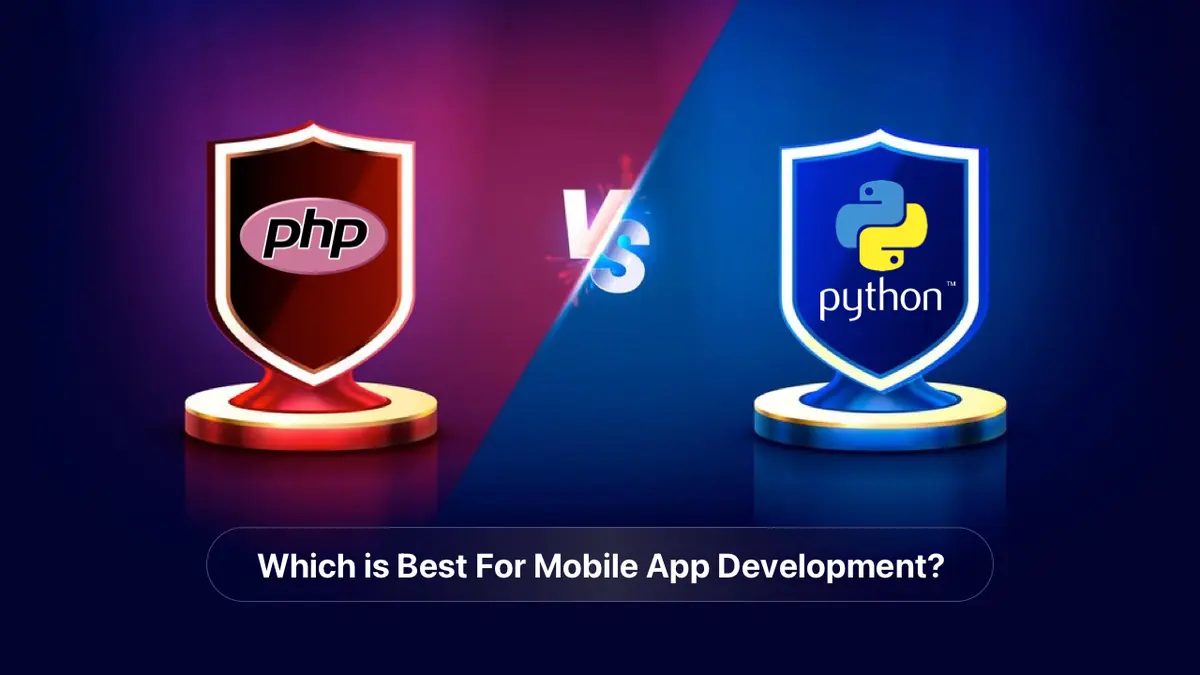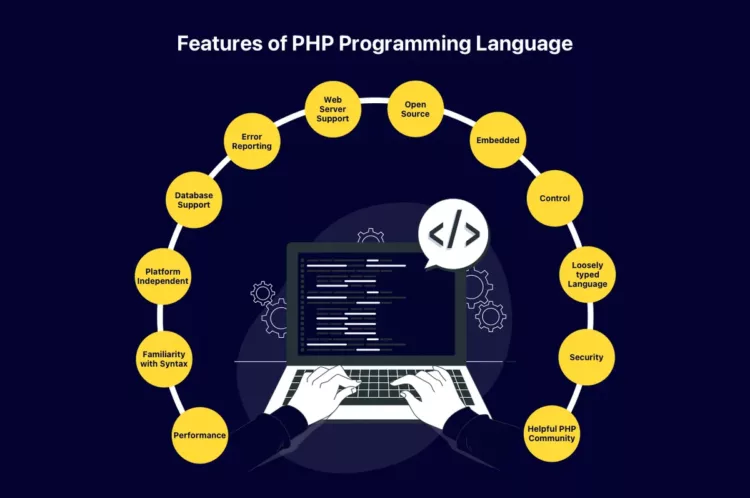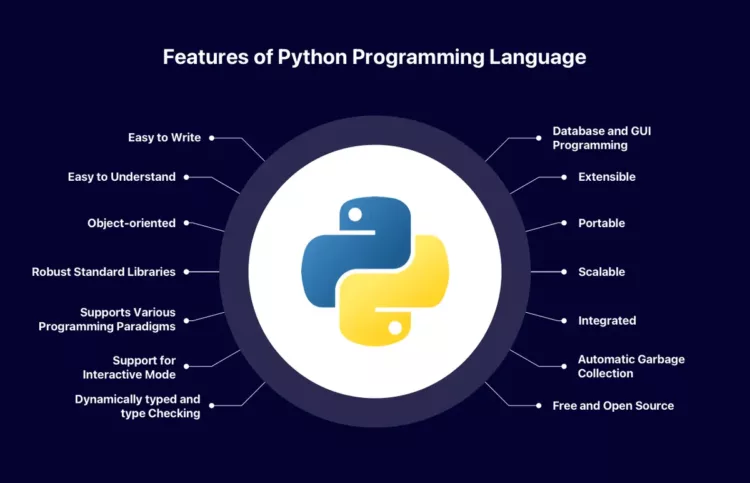
With every passing day, users are expecting even more high-end capabilities in an already formidably next-gen web app. Thus, at the supply end of the economic spectrum, the pressure to create more robust, high-performing, dependable, dynamic, and secure products is mounting on the web app makers.
Table of Contents
As such, to meet this rising demand and stay ahead in the race, it has become absolutely vital for business owners to choose the right tech stack and programming language. Among the several programming languages available (Python, Java, JavaScript, Ruby, PHP, etc.), the two choicest server-side selections made by developers worldwide are PHP and Python.
And while PHP has already been used by a large number of companies, the popularity of Python has also been steadily rising. But what exactly is the PHP vs Python debate? To know that, let’s first delve into what these languages exactly are.
PHP, which is the acronym for Hypertext Preprocessor, is a server-side scripting language that is used to develop dynamic websites or web applications. The programming language seamlessly integrates with all primary web servers on all the operating systems.
PHP is the most preferred language for pages having dynamic content. Also, it isn’t distributed under a General Public License and is still free to access.

Here are the most common advantages of using the PHP programming language:
There are only a few issues that developers have to deal with when using PHP: inconsistency, slower execution, and immutability of core behavior.
Python is an interpreted, high-level, & object-oriented programming language that has large library support. It’s used in developing scripting algorithms & standalone programs for various domains.
The language was created by Guido Van Rossum in 1989 and was first released in 1991, which is two years later. By supporting packages and modules, it makes the reuse of modularity and code features possible.
When using Python, programmers only need to write a few lines of code. This is why Python is widely considered as one of the fastest programming languages.
But, what’s Python’s use in web development?
Python offers various libraries–like Theano and Pandas–that work along with ML technology in a web-based environment. Django & Flask are the most popular Python frameworks, and the language is widely used in AI, Data Science, and the scientific community.

| Pros | Cons |
| Object orientation | Weak in mobile use |
| Readable | Speed limitations |
| Broad libraries | Design limitations |
| Improved productivity | Prone to runtime errors |
| Ease of integration | Database layers are less developed |
| Open source | |
| Portability | |
| Enterprise application | |
| Interpreted language |
Given that both programming languages are very complex, there isn’t one straightforward, all-encompassing approach that we can use to compare the two. For a more effective comparison, we will break down the entire process into separate criteria.
So, without much ado, let’s start with it:
This is the foundation on which a program for a certain platform is built. Though a framework can be compared to an Application Programming Interface, realistically, it includes an API.
As these use generic components and modules, the development process becomes more straightforward & less time-consuming via frameworks.
With that said, the difference between PHP and Python frameworks is primarily quantitative. Under PHP, more frameworks are available as compared to Python.
The most prominent PHP frameworks include CodeIgniter, Laravel, CakePHP, Symfony, and Slim. Meanwhile, the notable Python frameworks are Flask, Django, Tornado, and Scrapy.
Ask any developer, bugs are a real headache and a constant struggle. If adequate community support is not available, working with a specific programming language can be a tough nut to crack.
The good part is that both languages have extremely good community support.
When it comes to the cost of building an app, time has the maximum value (yes, more than the actual finances involved). By time, we mean the amount of it taken to develop the web app in general and that saved by using a particular language.
It is absolutely vital for a business to build the perfect app in time in order to get a hold of the market segment before the competitors. And to ease the Python vs PHP debate, here’s the conclusion that we’ve arrived at: Python is the faster of the two.
All due to its use of the Just-In-Time compiler. However, of late, our developers found that the JIT’s speed is less when compared with the PHP5’s upgrade to PHP7.
Further, Zend Engine 3.0 has also been released, eventually leading to the PHP7 vs Python comparison. Guess what won? PHP7.
Vulnerability of security is an aspect that always goes in tune with the web development process. Some of the most predominant web app vulnerabilities are cross-site request forgery, cross-site scripting, and SQL injection.
And with every passing year, the costs to fix these vulnerabilities exponentially increase. In terms of security, Python has been the first choice of cybersecurity professionals for backend development.
Django, for instance, has inbuilt security features that protect the application from various kinds of security threats. And to give you a clearer idea of its foolproof security feature, here’s something that you should know: many U.S. government authorities rely majorly on Python as their preferred hacking tool, as per WikiLeaks.
And although most security issues have to date, been, and are being addressed by strong community support, when it comes to security, PHP still does not stand a chance as compared to Python.
Take a look at the average hourly rate for middle to senior Python developers in Eastern Europe–around $50 to $70. At the same time, the hourly rates for PHP developers are around $40 to $60.
As per the current popularity trend, there is relatively more demand for Python among developers. And there is a significant decrease in PHP’s popularity.
Simply put, this means how well and how soon an application, process, network, or system can handle an expanding work quota. It also refers to the system’s capacity to expand in order to be able to accommodate that growth.
If not the only, scalability is definitely one of the most important features of any app solution. After all, it single-handedly determines whether a business is set for growth.
And no matter whether you own an established business or a startup, every business owner wants their empire to grow. PHP best offers you this chance as all internet solutions backed by this framework can seamlessly handle increasing traffic.
Thus, if you want to opt for a practical yet straightforward option, PHP is a wise choice.
Moreover, if you’re someone who wants to adopt the latest technological capabilities, then the Python framework is the best choice for you as it has AI & ML capabilities.
While Python has been created as a general-purpose language, PHP is solely a language for the web. Considering this, developers often raise the question: is Python a good choice for web development or should one only choose it as a PHP alternative?
And the concise answer to this query is yes.
Also, in the web development domain, Python is known as the direct competitor for JavaScript as well. And even though it is a multi-purpose platform, it is generally found in a wide range of web apps.
All in all, for firms wanting to develop small or medium-scale projects having limited features, PHP is for sure a good fit. Besides, if a brand’s priority is to simplify or speed up the development process, the framework’s ready-made tools also be considered here.
Further, PHP is a lucrative option for e-commerce and content management websites as it offers unparalleled integration with a massive range of third-party apps. And the case for Python has already been made in the previous section.
To summarize, there isn’t any ideal ‘best language for web development’. And to finally put an end to the PHP vs Python debate, both languages are equally suitable for web development. It all depends on your needs and how much bandwidth your developers have in terms of time and expertise.
If you need help with deciding which web solution and/or framework will work best for you, we at Code Brew Labs are here to help. Talk to us and we’ll get right back to you.
